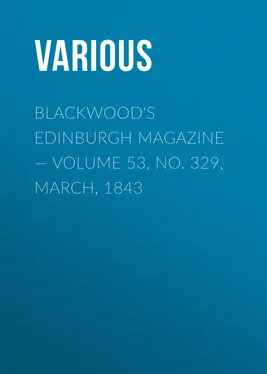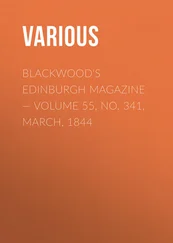Various - Blackwood's Edinburgh Magazine — Volume 53, No. 329, March, 1843
Здесь есть возможность читать онлайн «Various - Blackwood's Edinburgh Magazine — Volume 53, No. 329, March, 1843» — ознакомительный отрывок электронной книги совершенно бесплатно, а после прочтения отрывка купить полную версию. В некоторых случаях можно слушать аудио, скачать через торрент в формате fb2 и присутствует краткое содержание. Издательство: Иностранный паблик, Жанр: foreign_antique, periodic, foreign_edu, на английском языке. Описание произведения, (предисловие) а так же отзывы посетителей доступны на портале библиотеки ЛибКат.
- Название:Blackwood's Edinburgh Magazine — Volume 53, No. 329, March, 1843
- Автор:
- Издательство:Иностранный паблик
- Жанр:
- Год:неизвестен
- ISBN:нет данных
- Рейтинг книги:3 / 5. Голосов: 1
-
Избранное:Добавить в избранное
- Отзывы:
-
Ваша оценка:
- 60
- 1
- 2
- 3
- 4
- 5
Blackwood's Edinburgh Magazine — Volume 53, No. 329, March, 1843: краткое содержание, описание и аннотация
Предлагаем к чтению аннотацию, описание, краткое содержание или предисловие (зависит от того, что написал сам автор книги «Blackwood's Edinburgh Magazine — Volume 53, No. 329, March, 1843»). Если вы не нашли необходимую информацию о книге — напишите в комментариях, мы постараемся отыскать её.
Blackwood's Edinburgh Magazine — Volume 53, No. 329, March, 1843 — читать онлайн ознакомительный отрывок
Ниже представлен текст книги, разбитый по страницам. Система сохранения места последней прочитанной страницы, позволяет с удобством читать онлайн бесплатно книгу «Blackwood's Edinburgh Magazine — Volume 53, No. 329, March, 1843», без необходимости каждый раз заново искать на чём Вы остановились. Поставьте закладку, и сможете в любой момент перейти на страницу, на которой закончили чтение.
Интервал:
Закладка:
"With us these are everyday affairs!" he answered, delightedly marking each report. "Such skirmishes cherish among us a warlike spirit and warlike habits. With you, private quarrels end in a few blows of the dagger; among us they become the common business of whole villages, and any trifle is enough to occasion them. Probably they are fighting about some cow that has been stolen. With us it is no disgrace to steal in another village—the shame is, to be found out. Admire the coolness of our women; the balls are whizzing about like gnats, yet they pay no attention to them! Worthy wives and mothers of brave men! To be sure, there would be eternal disgrace to him who could wound a woman, yet no man can answer for a ball. A sharp eye may aim it; but blind chance carries it to the mark. But darkness is falling from heaven, and dividing these enemies for a moment. Let us hasten to my kinsmen."
Nothing but the experience of the Khan could have saved our travellers from frequent falls in the precipitous descent to the river Ouzén. Ammalát could see scarcely any thing before him; the double veil of night and weakness enveloped his eyes; his head turned: he beheld, as it were in a dream, when they again mounted an eminence, the gate and watch-tower of the Khan's house. With an uncertain foot he dismounted in a courtyard, surrounded by shouting noúkers and attendants; and he had hardly stepped over the grated threshold when his breath failed him—a deadly paleness poured its snow over the wounded man's face; and the young Bek, exhausted by loss of blood, fatigued by travel, hunger, and anguish of soul, fell senseless on the embroidered carpets.
POEMS AND BALLADS OF SCHILLER
No. VI.
THE LAY OF THE BELL
"Vivos voco—Mortuous plango—Fulgura frango."
Fast, in its prison-walls of earth,
Awaits the mould of bakèd clay.
Up, comrades, up, and aid the birth—
THE BELL that shall be born to-day!
And wearily now,
With the sweat of the brow,
Shall the work win its grace in the master's eye,
But the blessing that hallows must come from high.
And well an earnest word beseems
The work the earnest hand prepares;
Its load more light the labour deems,
When sweet discourse the labour shares.
So let us ponder—nor in vain—
What strength has wrought when labour wills;
For who would not the fool disdain
Who ne'er can feel what he fulfills?
And well it stamps our Human Race,
And hence the gift TO UNDERSTAND,
When in the musing heart we trace
Whate'er we fashion with the hand.
From the fir the fagot take,
Keep it, heap it hard and dry,
That the gather'd flame may break
Through the furnace, wroth and high.
Smolt the copper within—
Quick—the brass with the tin,
That the glutinous fluid that feeds the Bell
May flow in the right course glib and well.
What now these mines so deeply shroud,
What Force with Fire is moulding thus,
Shall from yon steeple, oft and loud,
Speak, witnessing of us!
It shall, in later days unfailing,
Rouse many an ear to rapt emotion;
Its solemn voice with Sorrow wailing,
Or choral chiming to Devotion.
Whatever sound in man's deep breast
Fate wakens, through his winding track,
Shall strike that metal-crownèd crest,
Which rings the moral answer back.
See the silvery bubbles spring!
Good! the mass is melting now!
Let the salts we duly bring
Purge the flood, and speed the flow.
From the dross and the scum,
Pure, the fusion must come;
For perfect and pure we the metal must keep,
That its voice may be perfect, and pure, and deep.
That voice, with merry music rife,
The cherish'd child shall welcome in;
What time the rosy dreams of life,
In the first slumber's arms begin.
As yet in Time's dark womb unwarning,
Repose the days, or foul or fair;
And watchful o'er that golden morning,
The Mother-Love's untiring care!
And swift the years like arrows fly—
No more with girls content to play,
Bounds the proud Boy upon his way,
Storms through loud life's tumultuous pleasures,
With pilgrim staff the wide world measures;
And, wearied with the wish to roam,
Again seeks, stranger-like, the Father-Home.
And, lo, as some sweet vision breaks
Out from its native morning skies,
With rosy shame on downcast cheeks,
The Virgin stands before his eyes.
A nameless longing seizes him!
From all his wild companions flown;
Tears, strange till then, his eyes bedim;
He wanders all alone.
Blushing, he glides where'er she move;
Her greeting can transport him;
To every mead to deck his love,
The happy wild flowers court him!
Sweet Hope—and tender Longing—ye
The growth of Life's first Age of Gold;
When the heart, swelling, seems to see
The gates of heaven unfold!
O Love, the beautiful and brief! O prime,
Glory, and verdure, of life's summer time!
Browning o'er the pipes are simmering,
Dip this fairy rod within;
If like glass the surface glimmering,
Then the casting may begin.
Brisk, brisk to the rest—
Quick!—the fusion to test;
And welcome, my merry men, welcome the sign,
If the ductile and brittle united combine.
For still where the strong is betrothed to the weak,
And the stern in sweet marriage is blent with the meek,
Rings the concord harmonious, both tender and strong:
So be it with thee, if for ever united,
The heart to the heart flows in one, love-delighted;
Illusion is brief, but Repentance is long.
Lovely, thither are they bringing,
With her virgin wreath, the Bride!
To the love-feast clearly ringing,
Tolls the church-bell far and wide!
With that sweetest holyday,
Must the May of Life depart;
With the cestus loosed—away
Flies ILLUSION from the heart!
Yet Love lingers lonely,
When Passion is mute,
And the blossoms may only
Give way to the fruit.
The Husband must enter
The hostile life,
With struggle and strife,
To plant or to watch,
To snare or to snatch,
To pray and importune,
Must wager and venture
And hunt down his fortune!
Then flows in a current the gear and the gain,
And the garners are fill'd with the gold of the grain,
Now a yard to the court, now a wing to the centre!
Within sits Another,
The thrifty Housewife;
The mild one, the mother—
Her home is her life.
In its circle she rules,
And the daughters she schools,
And she cautions the boys,
With a bustling command,
And a diligent hand
Employ'd she employs;
Gives order to store,
And the much makes the more;
Locks the chest and the wardrobe, with lavender smelling,
And the hum of the spindle goes quick through the dwelling;
And she hoards in the presses, well polish'd and full,
The snow of the linen, the shine of the wool;
Blends the sweet with the good, and from care and endeavour
Rests never!
Blithe the Master (where the while
From his roof he sees them smile)
Eyes the lands, and counts the gain;
There, the beams projecting far,
And the laden store-house are,
And the granaries bow'd beneath
The blessings of the golden grain;
There, in undulating motion,
Wave the corn-fields like an ocean.
Proud the boast the proud lips breathe:—
"My house is built upon a rock,
And sees unmoved the stormy shock
Of waves that fret below!"
What chain so strong, what girth so great,
To bind the giant form of Fate?—
Swift are the steps of Woe.
Now the casting may begin;
See the breach indented there:
Ere we run the fusion in,
Halt—and speed the pious prayer!
Pull the bung out—
See around and about
What vapour, what vapour—God help us!—has risen?—
Ha! the flame like a torrent leaps forth from its prison!
Интервал:
Закладка:
Похожие книги на «Blackwood's Edinburgh Magazine — Volume 53, No. 329, March, 1843»
Представляем Вашему вниманию похожие книги на «Blackwood's Edinburgh Magazine — Volume 53, No. 329, March, 1843» списком для выбора. Мы отобрали схожую по названию и смыслу литературу в надежде предоставить читателям больше вариантов отыскать новые, интересные, ещё непрочитанные произведения.
Обсуждение, отзывы о книге «Blackwood's Edinburgh Magazine — Volume 53, No. 329, March, 1843» и просто собственные мнения читателей. Оставьте ваши комментарии, напишите, что Вы думаете о произведении, его смысле или главных героях. Укажите что конкретно понравилось, а что нет, и почему Вы так считаете.












